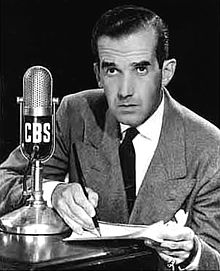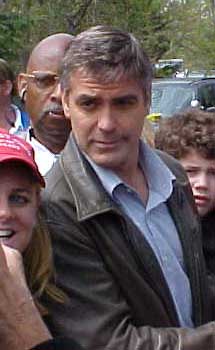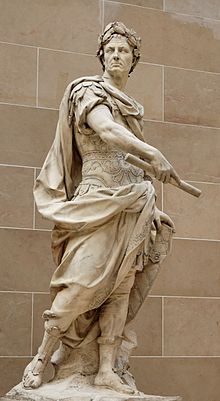Good Night, and Good Luck
Appearance








Good Night, and Good Luck is a 2005 historical drama film based on the old CBS news program See It Now set in 1954. It was a major influence on TV journalism which spawned many successors. The show was hosted by Edward R. Murrow, viewed by many journalists as one of journalism's greatest figures, for his honesty and integrity. The program is best remembered as the show that criticized McCarthyism and the Red Scare, contributing, if not leading, to the political downfall of Senator Joseph McCarthy. The film was directed by George Clooney and was nominated for six Academy Awards.
Quotes
[edit]Edward R. Murrow's Radio-Television News Directors Association Convention Address, delivered 15 October 1958, Chicago, Illinois
[edit](full text & youtube link to a 37 min recording of the presentation)
- This just might do nobody any good.
At the end of this discourse a few people may accuse this reporter of fouling his own comfortable nest, and your organization may be accused of having given hospitality to heretical and even dangerous thoughts. But I am persuaded that the elaborate structure of networks, advertising agencies, and sponsors will not be shaken or altered. It is my desire, if not my duty, to try to talk to you journeymen with some candor about what is happening to radio and television in this generous and capacious land. - I have no technical advice or counsel to offer those of you who labor in this vineyard, the one that produces words and pictures. You will, I am sure, forgive me for not telling you that the instruments with which you work are miraculous, that your responsibility is unprecedented, or that your aspirations are frequently frustrated. It is not necessary to remind you of the fact that your voice, amplified to the degree where it reaches from one end of the country to the other, does not confer upon you greater wisdom than when your voice reached only from one end of the bar to the other.
- All of these things -- All of these things you know. You should also know at the outset that, in the manner of witnesses before Congressional committees, I appear here voluntarily -- by invitation; that I am an employee of the Columbia Broadcasting System; that I am neither an officer nor any longer a director of that corporation; and that these remarks are strictly of a "do-it-yourself" nature. If what I have to say is responsible, then I alone am responsible for the saying of it. Seeking neither approbation from my employers, nor news sponsors, nor acclaim from the critics of radio and television, I cannot very well be disappointed.
- Believing that potentially the commercial system of broadcasting as practiced in this country is the best and freest yet devised, I have decided to express my concern about what I believe to be happening to radio and television. These instruments have been good to me beyond my due. There exists in my mind no reasonable grounds for any kind of personal complaint. I have no feud, either with my employers, any sponsors, or with the professional critics of radio and television. But I am seized with an abiding fear regarding what these two instruments are doing to our society, our culture, and our heritage.
- End of quotes from Convention Address
- To those who say people wouldn't look; they wouldn't be interested; they're too complacent, indifferent, and insulated, I can only reply: There is, in one reporter's opinion, considerable evidence against that contention. But even if they are right, what have they got to lose? Because if they are right, and this instrument is good for nothing but to entertain, amuse, and insulate, then the tube is flickering now and we will soon see that the whole struggle is lost.
- This instrument can teach; it can illuminate; yes, and even it can inspire. But it can do so only to the extent that humans are determined to use it to those ends. Otherwise it's nothing but wires and lights in a box. There is a great and perhaps decisive battle to be fought against ignorance, intolerance, and indifference. This weapon of television could be useful.
- Stonewall Jackson, who is generally believed to have known something about weapons, is reported to have said, "When war comes, you must draw the sword and throw away the scabbard." The trouble with television is that it is rusting in the scabbard during a battle for survival.
- Thank you for your patience.
- We cannot defend freedom abroad by deserting it at home.
- We're going with this story. Because the terror is right here in this room.
- No one familiar with the history of his country, can deny that congressional committees are useful. It is necessary to investigate before legislating.
- The line between investigating and persecuting is a very fine one, and the junior senator from Wisconsin has stepped over it repeatedly…. We must not confuse dissent with disloyalty. We must remember always that accusation is not proof and that conviction depends upon evidence and due process of law.
- We will not walk in fear, one of another…. We are not descended from fearful men — not from men who feared to write, to speak, to associate, and to defend causes that were, for the moment, unpopular….
- This is no time for men who oppose Sen. McCarthy's methods to keep silent or for those who approve. We can deny our heritage and our history but we cannot escape responsibility for the result. There is no way for a citizen of the republic to abdicate his responsibilities. As a nation we have come into our full inheritance at a tender age. We proclaim ourselves as indeed we are, the defenders of freedom where ever it still exists in the world. But we cannot defend freedom abroad by deserting it at home.
- The actions of the Junior Senator from Wisconsin have caused alarm and dismay amongst our allies abroad and given considerable comfort to our enemies. And who's fault is that? Not really his; he didn't create this situation of fear, he merely exploited it, and rather successfully. Cassius was right: the fault, dear Brutus, is not in our stars, but in ourselves. Good night, and good luck.
- Funny thing, Freddie, every time you light a cigarette for me, I know you're lying.
- Referring to a line from Julius Caesar recited by Senator McCarthy: Had Senator McCarthy looked just three lines earlier he would have found this: "The fault dear Brutus, is not in our stars but in ourselves...”
- We have currently a built-in allergy to unpleasant or disturbing information. Our mass media reflect this. But unless we get up off our fat surpluses and recognize that television in the main is being used to distract, delude, amuse, and insulate us, then television and those who finance it, those who look at it, and those who work at it, may see a totally different picture too late.
Joseph McCarthy
[edit]- Good evening. Mr. Edward R. Murrow, Educational Director of the Columbia Broadcasting System, devoted his program to an attack on the work of the United States Senate Investigating Committee, and on me personally as its chairman, and over the past four years he has made repeated attacks upon me and those fighting Communists.
- Now, ordinarily--I would not take time out from the important work at hand to answer Murrow. However, in this case, I feel justified in doing so because Murrow is a symbol,a leader and the cleverest of the jackal pack which is always found at the throat of anyone who dares to expose individual Communists and traitors.
Fred Friendly
[edit]- There's no news, boys, so go out there and make some news. Rob a bank, mug an old lady, whatever - just do something.
- Turn the phones on!
- Might as well go down swinging.
William Paley
[edit]- I'm with you today Ed, and I'm with you tomorrow.
- My cards. You lose, what happens? Five guys find themselves out of work. I'm responsible for a hell of a lot more than five god damned reporters. Let it go. McCarthy will self-destruct.
- There's a Knickerbocker game tonight, I've got front row seats. Are you interested?
Taglines
[edit]- We will not walk in fear of each other.
- In A Nation Terrorized By Its Own Government, One Man Dared to Tell The Truth
- They Took On The Government With Nothing But The Truth
Cast
[edit]- David Strathairn — Edward R. Murrow
- George Clooney — Fred Friendly
- Ray Wise — Don Hollenbeck
- Frank Langella — William S. Paley
- Robert Downey Jr. — Joseph Wershba
Quotes about
[edit]- Murrow and his reporting staff discovered Senator McCarthy was exploiting U.S. Air Force Reserve Lieutenant Milo Radulovich. Lieutenant Radulovich’s father, John, and his sister, Mrs. Margaret Fishman, were labeled communist sympathizers; and their close association with him caused a backlash. Without a trial, Radulovich was labeled a security risk by Senator McCarthy’s committee and lost his commission in the Reserves.Murrow and his staff found Senator McCarthy’s tactics and methodology questionable and decided to interview Lieutenant Radulovich on Murrow’s news documentary television show “See It Now.” Murrow’s broadcast drew attention to Radulovich’s plight and he was reinstated into the Air Force Reserves. McCarthy was given an opportunity for a rebuttal on “See It Now.” During the March 1954 episode, McCarthy questioned Murrow’s loyalties and labeled him a Communist sympathizer as well. Murrow’s staff was placed under close scrutiny. Faced with pressure from the CBS network to let the matter rest or lose sponsors, he and his staff decided it was imperative they point out the errors in McCarthy’s claims. McCarthy’s support waned after Murrow’s broadcast.
- The issues raised in the film, where to draw the line between reporting and editorializing, and the balance of news and entertainment in the media company, are still with us today.
- Good Night, and Good Luck, PBS News, Jeffrey Brown, (6 Oct 2005)
- In the movie, Murrow, played by David Strathairn, decides to expose the tactics of McCarthy by using senator's own words. Murrow's boss, William Paley, the legendary head of CBS, is by turn supportive and plenty worried about the impact the report will have on his network. But Paley would relent and the program aired, intensifying a public outcry against McCarthy. In late 1954, the senator was censured by his colleagues in the U.S. Senate.
There is inevitably a political side to a film that looks at a period of history in which many Americans then and now believe civil liberties were threatened in the hunt for communists.- Good Night, and Good Luck, PBS News, Jeffrey Brown, (6 Oct 2005)
- Murrow taking on McCarthy was one of the great high points in broadcast journalism, along with Cronkite stepping out from behind his desk and talking about how Vietnam doesn't work were two moments in broadcast journalism that you could point directly to and say actually changed American policy... I don't know a reporter that doesn't want to break a big news story. It is constantly the battle between commerce and news, or keeping entertainment from pushing the news off the air... I was looking to open a debate, to have a discussion, to be able to talk about issues that I think are important. It's simply saying, as Murrow says in the film, we have to find a way to find a safe place between the protection of the individual and the protection of the state at the same time.
- George Clooney in Good Night, and Good Luck, PBS News, Jeffrey Brown, (6 Oct 2005)
- I'm terrified of waking up at 65 years old, which is getting closer, and to wake up and say I didn't do the things that I was supposed to do... as a citizen... As someone who is well-known... I can help bring focus... And I try to, as a son of a journalist, when I take on those causes, to be really well informed so that they can't marginalize you or make you an idiot along the way.
- George Clooney in Good Night, and Good Luck, PBS News, Jeffrey Brown, (6 Oct 2005)
- "Good Night, and Good Luck" couldn't be more unlikely, more unfashionable or more compelling. Everything about it stands in stark opposition to the trends of the moment. Yet by sticking to events that are half a century old, it tells a story whose implications for today are inescapable. "Good Night" is a marvel of classic restraint in a hopped-up film culture. Shot in elegant black and white and featuring impeccable acting, it exists because of the lonely passion of director and co-star George Clooney... the son of a TV anchorman. That made him determined to examine in some detail the stand CBS newsman Edward R. Murrow took in 1954 against Senator Joseph McCarthy. Clooney had the nerve to believe that a drama of ideas could be as entertaining as "Desperate Housewives." He insisted that a fight for America's soul, a clash of values over intellectual issues like freedom of the press, had an intensity that would carry everything before it, and it does.
- On March 9, 1954, in a broadcast that has been called television’s finest hour... The show prompted more than 10,000 phone calls and 70,000 letters and telegrams — 15 to 1 in favor of Murrow. On the street, truck drivers yelled out, “Good show, Ed!” On December 2, 1954, the Senate formally reprimanded McCarthy by a vote of 67 to 22 for conduct unbecoming a senator. In speaking truth to power, Murrow hastened McCarthy’s downfall and may have been pivotal in it.
Good Night, and Good Luck functions on several levels. It is a cautionary tale about unrestrained political power and its use of public hysteria. It is also a tribute to the power of a dissenting media to expose and correct injustice. As such, the movie reproaches today’s journalism that embraces safety.

